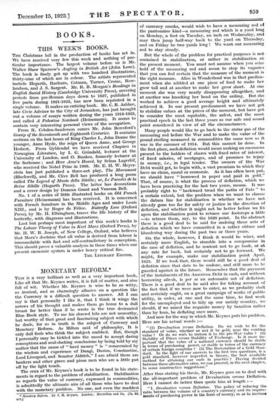BOOKS.
THIS WEEK'S BOOKS.
THE Christmas lull in the production of books has set in. We have received very few this week and nothing of par- ticular importance. The largest volume before us is Mr. Walter Shaw Sparrow's Angling in British Art (John Lane). The book is finely got up with two hundred illustrations, thirty-nine of which are in colour. The artists represented include Hogarth, Raeburn, Catalan, Turner, Crome, Row- landson, and J. S. Sargent. Mr. R. B. Morgan's Readings in English Social History (Cambridge University Press), covering periods from pre-Roman days down to 1837, published in five parts during 1921-1922, has now been reprinted in a single volume. It makes an enticing book. Mr. C. R. Ashbee, late Civic Adviser to the City of Jerusalem, has just brought out a volume of essays written during the years 1918-1928, and called A Palestine Notebook (Heinemann). It seems to contain very interesting personal views of the occupation.
From R. Cobden-Sanderson comes Mr. John Beresford's Gossip of the Seventeenth and Eighteenth Centuries. It contains sections on the last hours of King Charles I., John Donne the younger, Anne Hyde, the reign of Queen Anne, and George Herbert. From Gyldendal we have received Chapters in Norwegian Literature, by I. G. Grondahl, lecturer at the University of London, and 0. Rankes, formerly lecturer at the Sorbonne ; and Herr Arne's Hoard, by Selma Lagerlof, who received the Nobel Prize in 1909. Mr. E. H. W. Meyer- stein has just published a three-act play, The Monument (Blackwell), and Mr. Clive Bell has produced a long poem called The Legend of Monte della Sibilla ; or, Le Paradis de to Reine Sibille (Hogarth Press). The latter has decorations and a cover design by Duncan Grant and Vanessa Bell.
No. 1 of a series of little illustrated books on Old French Furniture (Heinemann) has been received. It is concerned with French furniture in the Middle Ages and under Louis XIII., and is by Roger de Felice. Butterfly Lore (Oxford Press), by Mr. H. Eltringham, traces the life history of the 'butterfly, with diagrams and illustrations.
Last but perhaps most important of this week's books is The Labour Theory of Value in Karl Marx (Oxford Press), by Mr. H. W. B. Joseph, of New College, Oxford, who believes that Marx's doctrine that all value is derived from labour is irreconcilable with fact and self-contradictory in conception. This should prove a valuable analysis in these times when our present economic system is under heavy critical fire.
THE LITERARY EDITOR.


















































 Previous page
Previous page